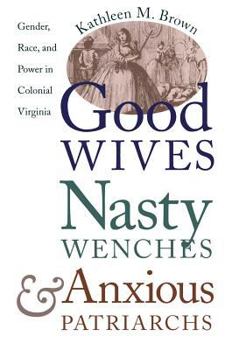Good Wives, Nasty Wenches, and Anxious Patriarchs: Gender, Race, and Power in Colonial Virginia
Select Format
Select Condition 
Book Overview
Kathleen Brown examines the origins of racism and slavery in British North America from the perspective of gender. Both a basic social relationship and a model for other social hierarchies, gender helped determine the construction of racial categories and the institution of slavery in Virginia. But the rise of racial slavery also transformed gender relations, including ideals of masculinity. In response to the presence of Indians, the shortage of...
Format:Hardcover
Language:English
ISBN:0807823074
ISBN13:9780807823071
Release Date:November 1996
Publisher:Omohundro Institute and Unc Press
Length:512 Pages
Weight:1.75 lbs.
Dimensions:1.0" x 6.1" x 9.3"
Customer Reviews
4 ratings
Oh, those Anxious Patriarchs
Published by Thriftbooks.com User , 14 years ago
According to Kathleen Brown, race and gender form the twin towers of political authority for elite white people in colonial Virginia. Brown extends her argument to include that historians have made a serious omission in their studies of slavery in colonial Virginia by not taking into account the issue of gender. In Good Wives, Nasty Wenches, and Anxious Patriarchs, Brown argues that gender inextricably linked to all other forms of servitude. Brown writes that laws were, "aimed at severing the ties of masculinity that bound enslaved and servant men together" (Brown, Good Wives, Nasty Wenches, and Anxious Patriarchs 181). Brown moreover has a complex view of culture and the process of change. Race and gender do not mean the same thing, independently and together at different times. In an understandable twist, Brown argues that women were complicit in their domination, "Without a more organic view of the relationship between gender, race, and power, we cannot begin to grapple with the legacy of colonial Virginia for the new nation, the antebellum South, and our own time" (Brown, Good Wives, Nasty Wenches, and Anxious Patriarchs 373). Brown shows how despite elite planters hegemony, wives, children, free people of color, and enslaved men and women sustained their influence upon race and class in colonial Virginia.
Putting gender on center stage
Published by Thriftbooks.com User , 17 years ago
During the seventeenth and eighteenth centuries, Anglo-American discourses of gender, race and power underwent major historical transformations; authority was no longer the "natural" expression of divine providence, and in the New World beliefs in fundamental sex differences acquired new meanings. As Kathleen M. Brown makes clear in her work, this was no simple transition; rather, the language of gender "became part of English efforts to define differences, communicate their own authority, and anchor their identities in Christianity and civility" in a land of unfamiliar land and peoples. Brown aims at nothing less than a revisioning of colonial Virginian society during this crucial early modern period by placing gender at the center of historical analysis of that "virgin" colony, Virginia, from the arrival of the earliest colonial settlers to the mid-eighteenth century, when the gentry elite reached the apex of their power. This work's novelty lies in Brown's insistence on gender as crucial in the demarcation of the sexual, racial, and class boundaries. However, Brown is not writing a "women's history" in the traditional sense; one of the strengths of her text is her insistence on the interconnectedness of gender, race, sex, and class. Thus some of her most provocative arguments examine the construction of white masculinity, notably during and after Bacon's rebellion. Brown ultimately succeeds in her goal to "complicate" our understanding of the initial setbacks in patriarchal social hierarchies, the "subsequent rise of the planter class and its authority,"and the ways in which race, class and gender shaped colonial society in this formidable work.
Ambitious...but...
Published by Thriftbooks.com User , 24 years ago
Covering an impressive range of materials, Brown offers an ambitious treatment of later 17th- and 18th- century colonial Virginia from the point of view of the marxist-feminist tetrad: race, gender, sexuality, class. As the book's title tends to suggest, the work is strongest when dealing with the connections between discourses of gender and race (and to a lesser extent, sexuality). The wide scope of the book means, however, that some of the nuances and complexities of these discourses and their connections (and this is particularly true in terms of 'class') remain untraced. A second weakness is that the text lacks wider direction. Perhaps we can excuse the absence of explicit discussion of the study's theoretical assumptions. Less so the failure to engage directly with previous historiography and to 'signpost' clearly the argument being made over 375-odd pp. Subheadings help but only when descriptive; those drawn from primary sources are of little value in guiding the reader.
An interesting perspective on gender analysis
Published by Thriftbooks.com User , 26 years ago
An insightful approach to gender analysis in colonial virginia, which questions our contemporary categories of race, gender and orientation. A bit longwinded at times, but still worth reading. A good companion for understanding race, religion and gender in the American South.






